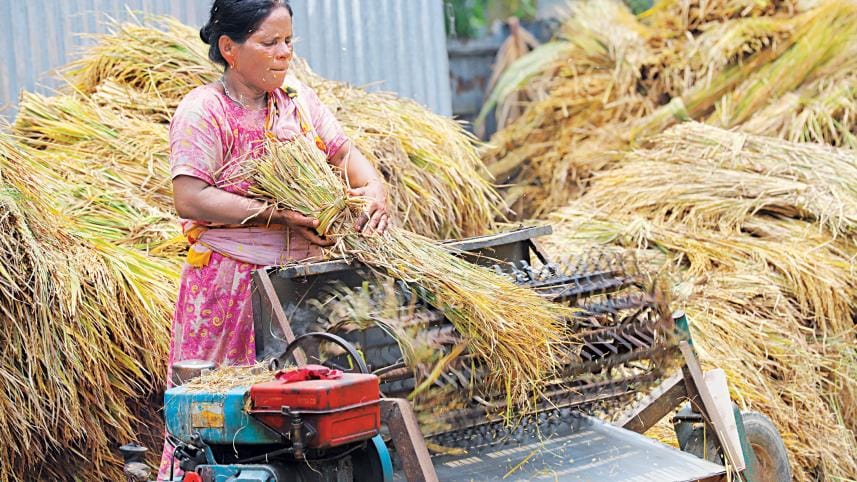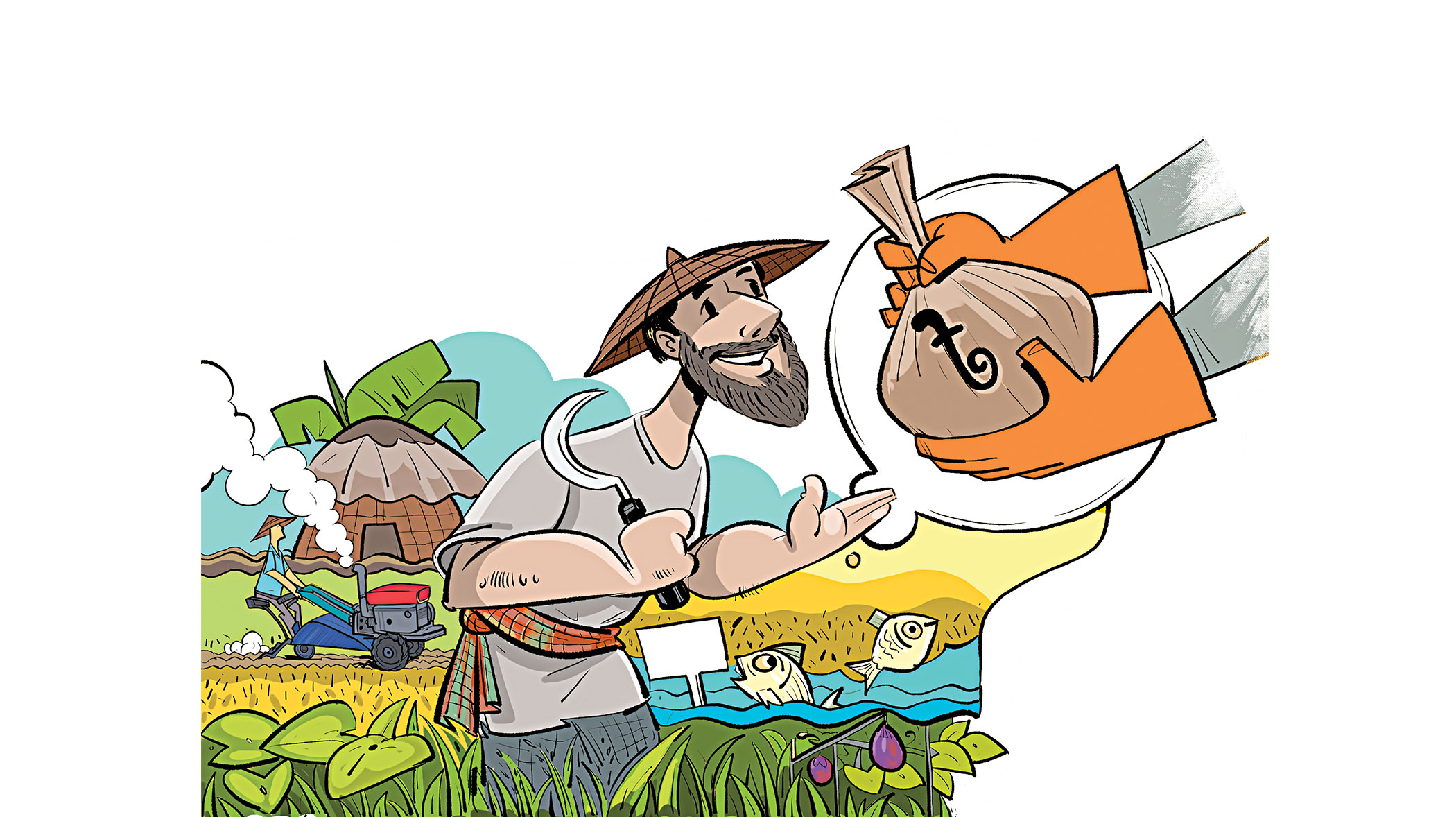Harvesting progress: Agri loans for women

Bangladesh, a land nourished by fertile deltas, thrives on its agricultural sector. But beneath the swaying crops lies a reality often unseen which is the immense contribution of women farmers. Women farmers in Bangladesh are the backbone of the country's agriculture sector, contributing significantly to the nation's food security and economy. Despite making up about half of the farm labor force, their efforts often go unpaid and unrecognized. Women are involved in every aspect of agriculture, from tilling the fields to post-harvest activities, and even fetching water for family use.
The government has taken various initiatives to ensure women's participation in every sector to empower them economically. The annual report (2022-23) of the Department of Agricultural Extension states that the department has undertaken several projects aiming at women's development and poverty alleviation to ensure at least 30% of women of the country's farmer families are involved in agricultural activities. Moreover, 30% participation of women has been ensured in all types of training and exhibition activities.
However, women farmers in Bangladesh face numerous challenges, including patriarchal norms and practices that hinder their empowerment. A study in northwestern Bangladesh found that women farmers worked longer hours than men, but received lower wages.
Despite their backbreaking labor in planting, weeding, and harvesting, women rarely own land or have control over the sale of produce. Societal norms often relegate them to the role of helpers, with the decision-making power resting with male family members. This lack of ownership directly impacts their ability to secure loans, as land is often considered the primary collateral. Even when women manage to overcome these barriers, the process of acquiring an Agri loan can be daunting.
The financial institutes also face difficulties in reaching out to women farmers in rural areas. "They are concentrated mostly on small home-bound poultry or dairy farms because that's easy for them to look after besides their homemaking. Other types of cultivation are male dominated and there are also too many dependences. Interestingly, we witnessed that women farmers are shy to availing of banking services assuming this could be a hassle to some and, besides, they also don't have much time to spare out of their busy schedule. However, BRAC Bank provides collateral-free agriculture loans to smallholder farmers irrespective of gender. Therefore, land ownership and documentation do not make crucial sense to us in assessing credit. Nonetheless, we prefer to have a personal guarantee over BDT 50,000 loans," shares Syed Abdul Momen, Deputy Managing Director & Head of SME Banking, at BRAC Bank.
Furthermore, Md. Katebur Rahman, Senior Vice President and Head of the Agriculture Banking Unit, Dhaka Bank states, "The main challenges for the women farmers are education and ownership of land. As the rural women are getting basic education, financial institutions like Dhaka Bank are developing policies to provide agricultural loans to rural women."
Another reason behind women farmers' lack of awareness regarding banking loans is financial illiteracy. Mr. Katebur comments, "The access to training and development of women in agriculture is very much insignificant. The participation rate of women in training programs is much lower than men in Bangladesh. It may be due to social, religious, and traditional bindings for women which restrict the women from going to a crowd where many other males are also present. However, most of the time, we try to arrange a day-long workshop for the women working in agricultural businesses at their convenient places so that they can participate easily and can apply the knowledge in their businesses."
Nonetheless, various banks and financial institutions are working towards ensuring financial security for women. Mr. Momen from BRAC Bank shares, "BRAC Bank's 'TARA' is a dedicated banking service designed for women segment beneficiaries including the agriculture segments. To encourage the women farmers, we are offering special schemes with 10 Tk farmers' accounts which have no account maintenance fee with certain conditions, access to agent banking outlets, collateral-free loans with easy terms, alongside lower interest rates and minimum documentation charges than that of general loans. The digital loan processing system has also been initiated to cater to this segment to minimize the turnaround time."
Md Nasiruzzaman, Chairman of Bangladesh Krishi Bank shares, "At Krishi Bank, we have passed the policy this year to implement the Kalikapur model of harvesting in wasteland which was invented by the Bangladesh Agricultural Research Institute. Only the women farmers will get a 10,000 Tk loan for this harvesting model in their own courtyard without any collateral fee. Through this 'Amar Angina, Amar Krishi' program, we hope to ensure food security for the poor as well."
While numerous schemes target women entrepreneurs, there's a noticeable gap in agri-based schemes tailored for them, even at the government level. "Most women-centric schemes fall under small initiatives. Moreover, we scarcely see any female farmer coming forward, rather there is more women participation in the poultry and fishery sector," shares Kamrul Mehedi, Head of SME, City Bank.
He further adds, "Without the presence of a strong distribution network, whether it is physical or digital, it becomes extremely difficult to reach the customers."
Elaborating on the strength of the distribution network, Ahsan Jamil, Vice President and Head of SME and Agri Loan, Midland Bank states, "We distribute loans through various NGOs due to their robust agent network. NGOs establish committees for micro-credit distribution and excel in recovery, an area challenging for banks. While private banks extend their reach to upazila and thana levels, grassroots areas remain under-served. NGOs bridge this gap with their extensive agent networks, vital until banks establish a public-level presence. Although we're progressing with agent banking, it's still evolving and requires more time to mature."
By addressing these challenges, Bangladesh can unlock the full potential of its agricultural sector. Empowering women farmers through accessible Agri loans will not only improve their livelihoods but also contribute to national food security and economic growth.



 For all latest news, follow The Daily Star's Google News channel.
For all latest news, follow The Daily Star's Google News channel. 
Comments